Back to the beginning
Urban India generates about 1.45 Lakh tonnes of Municipal Solid Waste (MSW), out of which nearly 35% to 40% is dry waste and most fractions of dry waste are reused or recycled. India's recycling rate is higher as compared to other countries due to the age-old practice of reusing and recycling. Due to the various pathbreaking initiatives taken by the civic bodies, the waste which is picked from households and other areas is getting recycled and reused leading to transformation in the lives of stakeholders by generating employment opportunities, empowerment of underprivileged, apart from environmental preservation.
The waste collected from household and other sources is being transported to collection & Material Recovery Centres, sorted, segregated and then processed to make it reusable-back to source again. This process paves way for circular economy, by sending the materials, minimizing resource consumption, reducing waste, and lowering carbon emissions. The goal is to extend the lifespan of products and ensuring they can be utilized repeatedly.
Self Help Groups (SHGs) offer a distinctive method of financial intermediation by providing affordable financial services while promoting self-management and development among its women members. In Chandigarh, "Naya Sa" a women-led enterprise, contributes to the welfare of the underprivileged and creates employment opportunities by selling donated clothes that have been repaired, cleaned, and ironed. Similarly, Rani Self Help Group manufactures and sells cloth bags as a sustainable alternative to polythene bags, aligning with the principles of reducing waste, reusing materials, and recycling, while also generating income for its members.
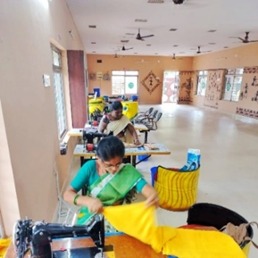
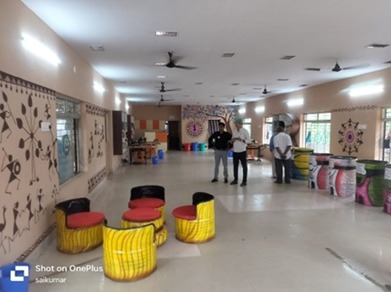
Under Swachh Bharat Mission-Urban 2.0, the upscaling and recycling of discarded items is being channelized through the RRR Centres and the recyclers to improve the recycling value chain. The Greater Visakhapatnam Municipal Corporation (GVMC) has started several permanent RRR centres across different zones. These centres not only work as one-stop kiosk for waste donation and dissemination but some of them also sell reusable products made from recycled waste item. In women’s Rest-O-Café at Jagdamba Junction, Vishakhapatnam, hanging lamps made with discarded energy drink cans, seats made of automobile tyres are showcased. In Chandigarh, Swachh Sawari has been deployed to collect clothes from door to door in various parts of the city - “Aapke ghar se Unke ghar tak”. A helpline number 9041998099 has also been started for information on Swachh Sawari.
In many cities Construction and Demollition (C&D) waste plants are producing various by-products like bricks, from the debris, so that there are no piles of construction wastes in the open. Delhi’s first C&D Waste recycling plant converts waste to, kerbstone, pavement blocks, Concrete Bricks, aggregates, manufactured sand which saves precious natural resources. (C&D) waste recycling plant in Delhi’s Burari processes the construction waste in the same manner. Chandigarh have issued toll-free helpline number i.e. 0172-2787200 for C&D waste.
For sustainable economic growth and promotion of circular economy country aims for net-zero emission by 2070 in which waste to biogas is expected to play a crucial role. 500 new ‘waste to wealth’ plants under GOBARdhan scheme will be established for promoting circular economy. These will include 200 compressed biogas plants, including 75 plants in urban areas, and 300 community or cluster-based plants. Indore, Pune, Ambala, Chennai, Varanasi, Surat, Tirupati, Visakhapatnam, Hyderabad all boast of operational CBG Plants, whereas Solapur, Goa, Nashik, Vijaywada, Hyderabad and Bhopal have Waste to Electricity plants.
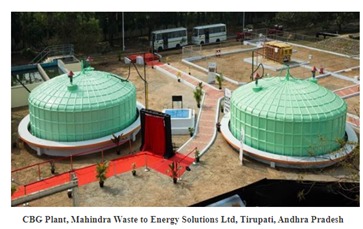
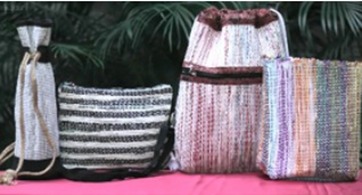
In the vermi-compost plant at Vellalore, 100 MT of segregated waste is processed and converted into compost. Karnataka Compost Development Corporation Ltd. (KCDC), uses Bengaluru city’s wet waste to make compost and vermi-compost for gardening enthusiasts. Waste management startups are playing a vital role in waste recycling by providing different solutions. Ecokaari is upcycling waste plastic into bags and wrappers via a unique weaving process using a traditional Charkha and Handloom to make premium handcrafted items, PadCare Labs are using an automated hygiene management system that generates harmless, recyclable output out of used sanitary napkins.
Donning the water plus city hat, many ULBs are treating waste water that is being reused for industrial use, irrigation, river flow maintenance, water recreation etc. Karad, a water+ city of Maharashtra, follows a proper sewage treatment process and has been putting the treated water to meaningful use i.e. irrigation for sugar crop, watering for gardens, nursery, Miayawaki plantation and roadside tree plantation etc. To promote sustainability and circular economy, Surat started reuse of treated waste water in various non-potable purposes like industrial use, rejuvenation of lakes, agriculture, mass plantation, sewer cleaning etc.
Trash is revolutionizing urban life as cities strive to become garbage-free. Waste is returning to its origins, marking a new beginning for sustainable living.
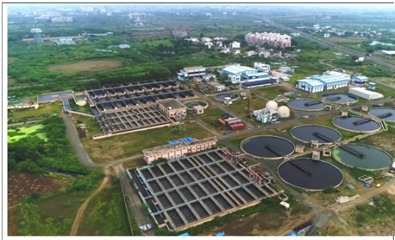
For regular updates, please follow the Swachh Bharat Mission’s official website and social media properties:
Website : www.sbmurban.org
Facebook : Swachh Bharat Mission - Urban | Twitter: @SwachhBharatGov
Instagram: sbm_urban | YouTube: Swachh Bharat Urban | Linkedin: swachh-bharat-urban